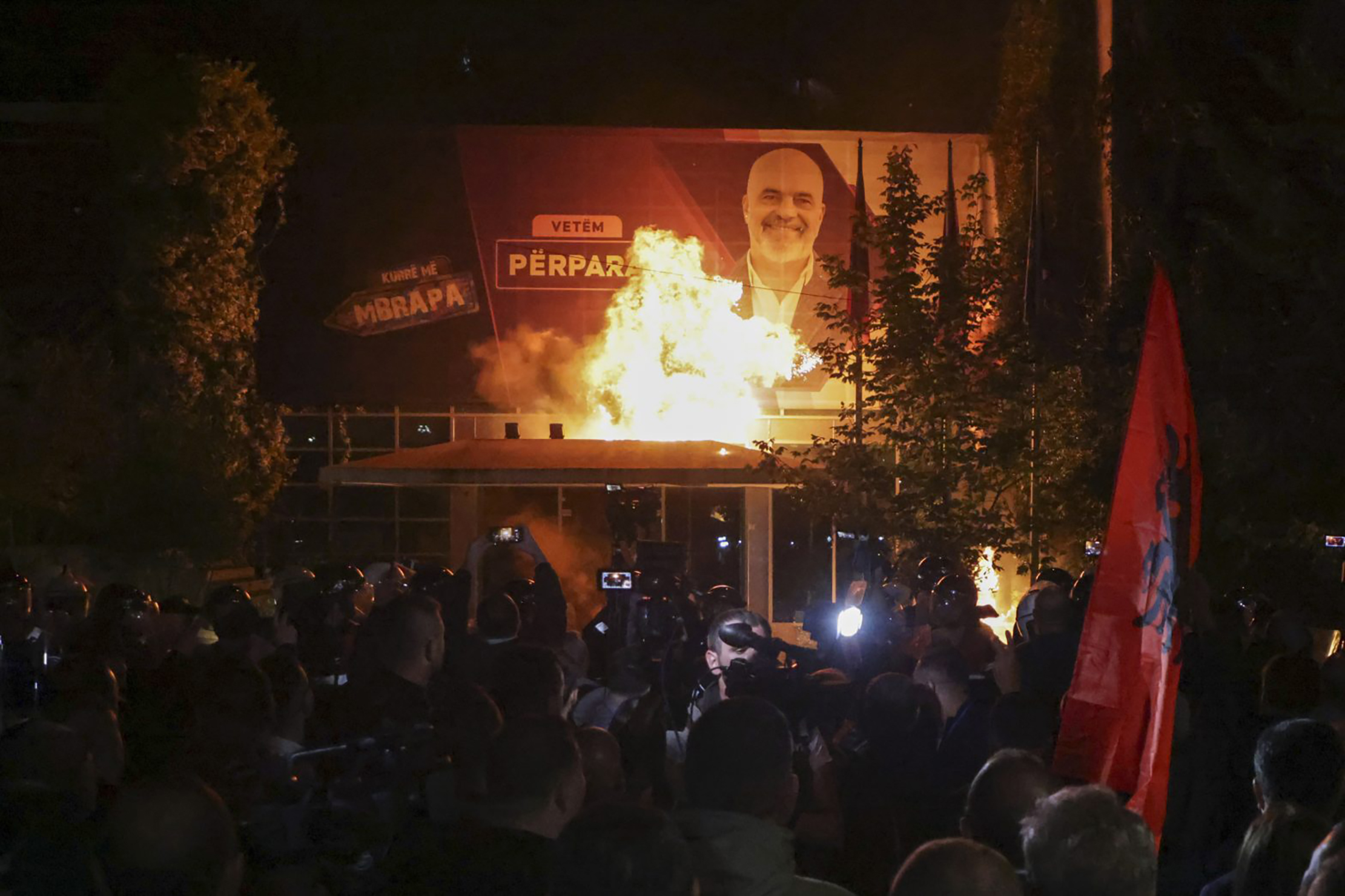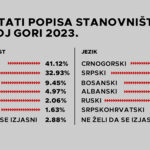This fall, a new spirit of protest has engulfed the capital of Albania, while the Albanian opposition raised its voice against the conviction of former MP Ervin Salianji and the government of Prime Minister Edi Rama. With no political speeches and a yet-unknown plan, the deputies of the Democratic Party, supported by hundreds of citizens, have started an unprecedented march towards the “Dëshmorët e Kombit” boulevard. But what is behind this unusual action of the opposition? With blocked roads and numerous police forces on the ground, could these events mark the beginning of a new political confrontation in Albania?
From the Courtroom to the Streets: Salianji’s Role in Albania’s Political Protests
The entire pretext for these protests stems from the Albanian Court of Appeal’s conviction of Ervin Salianji, former MP of the Democratic Party, who was hit with the sentencing of 1 year in prison for the criminal offense of “false reporting” on the “Babale” file case.
The conviction of MP Ervin Salianji stems from an incident in 2018, when he released an audio recording accusing Agron Xhafaj, the brother of then-Minister of Internal Affairs Fatmir Xhafaj, Agron Xhafaj, of drug trafficking. The case, known as the “Babalja” case, involved two recordings published by the Democratic Party, where the wiretaps were claimed to have been secretly recorded by Albert Veliu (pseudonym “Babalja”), his brother-in-law Alfred Alizoti and journalist Jetmir Olldashi. Through these secret recordings, the Democratic Party demanded the removal of Xhafaj from the post, claiming that he would protect his accused brother’s interests, who also freely roamed Albania though he still had 4 years in prison to serve in Italy.
The whole case was dubbed the “Babalja” file, since that was the pseudonym the “unknown drug trafficker” was called by in the intercepts, real name Albert Veliu. The audio recording, after being obtained by the Serious Crimes Prosecution Service, was sent to experts in England, who concluded that the recording was not authentic. Alizoti’s testimony was added to the expert’s decision, as he admitted that he had imitated the voice of the minister’s brother, after he had been promised 200 thousand euros by Salianji. He stated that he had decided to tell the truth since his accomplice “Babalja” had not given him his share of the profits.
As for Agron Xhafaj, who was framed as a drug trafficker in the recording, testified to knowing Albert Veliu personally and having lent him money because Veliu had gambling problems, but denied discussing drug trafficking with him. Xhafaj claimed that the Democratic Party’s accusations were aimed at damaging his brother’s reputation as Minister of Internal Affairs. He also recognized the voice in the audio recording as that of Albert Veliu, who often visited his café, but denied any involvement in the illegal activities mentioned.
After the Serious Crimes decision, the Tirana Prosecutor’s Office initiated criminal proceedings following a report by Agron Xhafaj, who had turned himself into Italian authorities to serve the rest of his sentence. In the end, Fredi Alizoti was sentenced to 2 years in prison, Ervin Salianji received a 1-year sentence for false reporting, Albert Veliu was sentenced to 3 years and 6 months, and journalist Jetmir Olldashi was sentenced to 100 hours of community service.
Although Salianji was convicted in 2019, he did not serve time in prison immediately, as he was under investigation without custody. Now, after six years, his one-year prison sentence will take effect once his parliamentary immunity is lifted. The Court of Appeal said they will uphold this decision, which is what incensed the Democratic Party and resulted in the protests.
Tracking the Rise and Flow of the Anti-Government Protests
The protests on October 7th are so far the protests which garnered the most attention, within Albania and internationally. Opposition supporters in Albania took to the streets, demanding the government step down and be replaced by a temporary interim government which will oversee the upcoming parliamentary elections.
Ervin Salanji’s recent imprisonment might have been the pretext to kick off these protests, but the conservative opposition, led by the Democratic Party, has long accused Prime Minister Edi Rama’s Socialist Party of corruption, rigging previous elections, and undermining the judiciary.
The Democratic Party claims Salanji’s imprisonment is a politically motivated case, with Salanji calling himself “the first political prisoner in 34 years of pluralism”. Salianji has appealed his conviction. The opposition has also been calling for the release of their leader, Sali Berisha, who is under house arrest due to a corruption investigation.
Protests intensified on October 7th as a few thousand opposition supporters gathered in front of key government buildings in Tirana, chanting slogans like “Down with the dictatorship” and “Berisha, Berisha.” Demonstrators briefly clashed with the police, throwing Molotov cocktails outside the main government building and the Socialist Party headquarters, where they also burned a poster of Prime Minister Rama. The protesters later targeted the Ministry of Internal Affairs and City Hall similarly.
Outside parliament, the situation escalated further, with police using tear gas to disperse the crowds. Several hundred police officers had been deployed to protect government institutions, and traffic was blocked in many parts of downtown Tirana.
According to police, 10 officers were injured by Molotov cocktails and other objects thrown by protesters. Some demonstrators were affected by tear gas, with a few taken to the hospital for treatment, as reported by local media.
A Real Threat to Edi Rama’s Rule? Analyzing the Protests
Since assuming office in 2013, Edi Rama has remained Prime Minister of Albania. The Albanian constitution says nothing about how many terms the prime minister can serve, raising concerns among Albanians, international observers, and particularly the Democratic Party of Albania. The absence of term limits has allowed Rama to extend his tenure, prompting criticism from those who advocate for democratic principles and leadership rotation. Some critics say this is just a different form of the totalitarian government that communist Albania used to be under.
The Democratic Party, as the main opposition force, has consistently opposed Rama’s prolonged stay in power, often employing various strategies to challenge his administration, sometimes controversially. There’s a disconnect between the ultimate goal of putting a lid on Rama’s power and influence, which is a fairly common viewpoint of the Albanian population, and achieving that through protesting for Ervin Salianji’s release, who many believe to be guilty.
On October 21st, Ilir Meta, who is the former president of Albania, the leader of the Freedom Party (Partia e Lirisë) and one of the most prominent political figures leading the opposition protests, has just been arrested on corruption charges by SPAK, the Albanian special forces. His wife, Monika Kryemadhi, a member of Parliament and former leader of the Freedom Party, faces the same charges. SPAK comments that both individuals are suspected of the criminal offenses “refusal to declare, non-declaration, concealment, and false declaration of assets”.
Police used force after Meta refused to get out of his car and reportedly insulted officers and judicial officials. Meta’s Freedom Party was formerly aligned with Prime Minister Edi Rama’s Socialist Party. However, the two had a bitter falling out, with Meta becoming a strong critic of Rama and spearheading the opposition protests. And now that he’s been arrested, it further dampens hope for their effectiveness.
Despite these efforts, recent protests against Rama’s government are already losing momentum in the public eye. The protests on October 7th were the biggest splash the opposition has made so far, and they have yet to replicate anything similar. They are unlikely to succeed in forcing the creation of an interim government before the scheduled parliamentary elections. This situation reflects a broader frustration among some Albanians with political stagnation and concerns over democratic governance.
The ongoing debates over leadership and governance in Albania underscore the challenges of political continuity versus democratic renewal. This is a dilemma facing many emerging democracies, but in Albania, it has unfortunately become a recurring issue with no solution in sight.
The United States embassy had advised its citizens to avoid the protest, highlighting concerns about potential unrest. Both the US and the European Union have urged the opposition to engage in dialogue with the government, instead of violent protests.
The more violent the protests, the more poorly they reflect on Albania as a EU candidate and as a democratic country. Though the EU hasn’t commented much on the protests, it’s implied that Albania must prove itself capable of resolving civil unrest and opposition protests through adhering to democratic norms.



